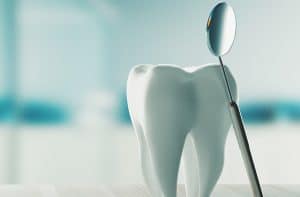 The point of any restorative dental treatment is to successfully restore a tooth’s ability to function properly. This can require different levels of restoration depending on the tooth’s specific concern and the extent of that concern’s impact on the tooth’s health and integrity. Because they’re designed to cap the entire visible structure of a tooth, modern dental crowns are often the ideal solution for achieving this goal with optimal results, and for a wide range of different tooth concerns.
The point of any restorative dental treatment is to successfully restore a tooth’s ability to function properly. This can require different levels of restoration depending on the tooth’s specific concern and the extent of that concern’s impact on the tooth’s health and integrity. Because they’re designed to cap the entire visible structure of a tooth, modern dental crowns are often the ideal solution for achieving this goal with optimal results, and for a wide range of different tooth concerns.
When the tooth has a big fracture in it
A fracture in your tooth’s natural crown structure can pose a few different problems for your oral health, each of which is significant and can grow increasingly worse. In addition to the discomfort that a tooth fracture can cause, there’s also the risk of the fracture becoming more extensive under the pressure of your bite. If it becomes severe enough, the crack can expose your tooth’s nerves and blood vessels to harmful bacteria and infection. In more severe cases, the fracture might extend to the root and lead to the extraction of the tooth. Placing a lifelike dental crown over the tooth can stop the fracture from getting worse and restore the tooth’s ability to function.
When a piece of the tooth breaks off
A broken tooth isn’t the same as a fractured tooth. Unlike a tooth fracture, a break in your tooth’s structure means that a piece of it has separated completely from the main structure. This can pose similar threats to your tooth, including the heightened risk of the damage becoming more severe over time. It can also impact your overall bite alignment and balance, particularly if all or part of the broken piece is from your tooth’s chewing surface. Restoring the broken tooth with a custom-designed dental crown can be the best way to prevent it from negatively impacting the rest of your oral health, as well as give the tooth its ability to function properly again.
When the tooth receives root canal treatment
Damage to your tooth such as a fracture or break can pose direct threats to your tooth’s health and integrity until they’re addressed. Other direct threats can include the erosion of your tooth’s structure due to the development of tooth decay. In severe cases of decay, the only way to save the tooth is to perform root canal treatment to remove the infected tooth structure and tissues from within it. After the root canal procedure, placing a dental crown over the tooth can fortify its remaining healthy, natural structure and prevent it from becoming damaged or weakened any further.
Learn how a dental crown can save your tooth
Dental crowns can save teeth from a multitude of different concerns, including some types of damage that seem more severe than others. To learn more, schedule an appointment by calling Gentle Smiles in Dallas, TX, today at 972-329-7645 (972-329-SMILE).






Recent Comments